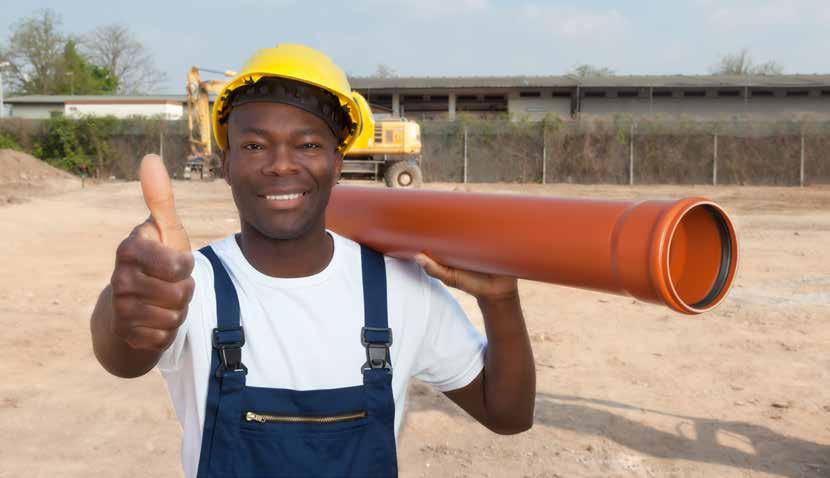SANITATION
A means for economic recovery and job creation The innovative social franchising partnership and entrepreneurship approach to the routine maintenance of water and sanitation infrastructure offers huge potential for small entrepreneur development and job creation, as demonstrated by its successful application in the maintenance of off-grid and on-site sanitation systems in homes and schools in South Africa. By Kevin Wall, Oliver Ive and Jay Bhagwan*
S
ustainable Development Goal (SDG) 6 calls for access to adequate and equitable sanitation and hygiene for all and an end to open defecation by 2030. It also calls for increased participation of local communities and a focus on job creation and entrepreneurship. While centralised sewered systems are a proven basis for the safe disposal of faeces and urine, billions of people around the world do not enjoy this option, particularly those in informal peri-urban settlements that lack formal utility coverage. To help meet SDG 6, on-site sanitation is the best alternative, but it must be operated and maintained correctly, or it will fail to provide an adequate service. In South Africa, a lack of maintenance has rendered much on-site sanitation infrastructure unusable. This is largely due to a lack of skills, incentives or support for those with the skills to undertake the maintenance. The challenge for on-site sanitation is one of the limitation of technology for ease of operation and maintenance, exacerbated by the social and institutional aspects that determine if any given solution will work in a real-world situation. However, South African experience provides a potential answer for this challenge: social franchising.
Social franchising
The concept of for-profit franchising is well established. South Africa is home to over 400 for-profit franchised types of businesses, with tens of thousands of outlets. With proven business models set
48
SE PT /O CT 2020
up specifically so that they can be widely copied, and with mutual support guaranteed, franchisees are far less likely to fail than independent small businesses would be under comparable circumstances. Social franchising is a well-known worldwide adaptation of for-profit franchising, where the emphasis is less commercially driven and more on providing a social service. The Water Research Commission (WRC) funded work in the water services sector to pioneer franchising concepts developed by Dr Kevin Wall of the CSIR. The early work, published in 2005, identified the potential for adapting the franchising model for the operation and maintenance of water and sanitation infrastructure, while simultaneously promoting local economic development. Three successive WRC projects and parallel pilot projects on the maintenance of low-technology sanitation facilities followed in shaping the social franchising model. A more recent partnership with the African Development Bank (AfDB) introduced a strong element of health education, real-time logistics management, new clients and new types of infrastructure being maintained, and a spreading of the geographical footprint.
Field-based pilot and subsequent replication
An extensive field-based pilot study, led by Amanz’ abantu Services and the CSIR, and funded by the WRC, ran from 2009 to 2012. Lessons from this initiative proved how effective the concept could be in
maintaining on-site water and sanitation services, and at the same time creating and nurturing first-time microentrepreneurs (mostly women) and training them and their employees. A non-profit subsidiary of Amanz’ abantu – Impilo Yabantu (meaning ‘hygiene for the people’ in isiXhosa) – was established to take on the role of the franchisor, which supports the local franchisee partners. Through this vehicle, the franchisees have been implementing the approach, working with municipalities in the Eastern Cape and the provincial Department of Education (DOE) to tackle sanitation and water infrastructure operational issues at a significant scale. The service objective of the pilot project was simple – to clean household and school toilets, and remove the faecal sludge, disposing of it in a way that is safe for the franchisee workers and the environment. At its peak, the programme was regularly servicing over 1 200 schools. Unfortunately, institutional and governance challenges at the DOE resulted in the contract not being extended beyond 2016.
Evolving approach
The scope of work undertaken by the franchisees has changed considerably over the years. In the beginning, the franchisees simply emptied VIPs (ventilated improved pit latrines). In an early evolution of the franchising approach, franchisees also repaired the toilets and rainwater harvesting facilities. Since then, the scope has steadily become more ambitious, including that the sludge is no longer




















